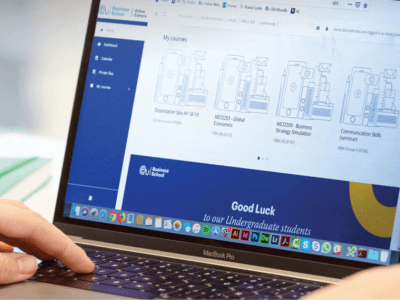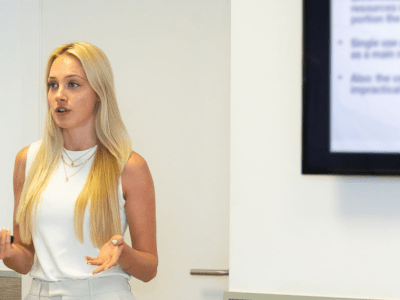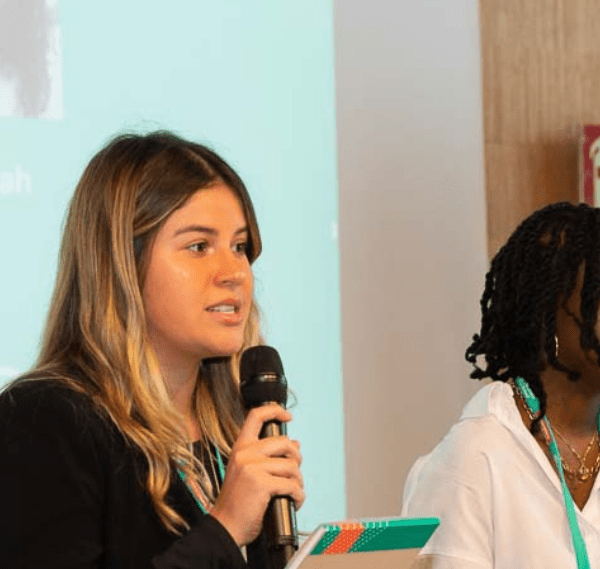Why is it important for individuals and businesses to understand their purpose?
This is the question that business strategist Alex Dilme posed to EU Business School students when he opened his presentation, entitled “Why We Need a Why”.
According to Alex, when businesses and individuals fully understand the answer to this question, it is then possible to build sustainable competitive advantages. This certainly is the case from both a company perspective and in terms of personal employee goals and outputs, including your own.
In this post, we’re going to outline the key takeaways from Alex’s presentation. We’ll look specifically at how businesses can identify their “why” and build a mission that informs everything from high-level strategy to day-to-day tasks.
Alex Dilme was born in Girona, a city in northern Catalonia. He attributes his grasp of English, which has been of significant benefit to his career, to his British mother. As a child, he played handball competitively, which he says led to his competitive streak. After attending university, he developed various social projects, particularly in the Philippines, which gave him essential insights about his future and the kind of impacts he wanted to make. He worked for McKinsey and Company for a period before moving onto his current employer, GB Foods, an international food production and distribution company, where Alex sees himself managing strategy for Africa, with a particular emphasis on culture and sustainability.
Foundational Lessons for Finding Your Personal “Why”
Alex began his presentation by talking about some of the key lessons he learned during his twenties.
He highlighted the following points that students and graduates should consider:
- Iterate and explore – Alex changed jobs multiple times throughout his twenties. He emphasized the importance of trying different things to find out what you are truly passionate about. It’s not until you get your hands dirty, he said, that you’ll really know what you want to do.
- Set a foundation for failure – It’s important to create a space for failure in your twenties, particularly when it comes to finances. Don’t create financial burdens that force you to stay in a job. Foster an environment in which the consequences of failure are not too severe, thus giving yourself the space to experiment with new ideas.
- Trade money for learning – Don’t prioritize money in your twenties. Instead, focus on building new skills and experiences that will enable you to thrive when you decide on a definite career path that you are sure you want to take.
- Know yourself – Self-knowledge underpins any successful search for purpose. Alex recommended that people in their twenties spend time alone, take breaks and pursue experiences that can illuminate their values.
- Prioritize direction over speed – When you pick the right direction, gathering speed ensues naturally. You need to know you’re in the right lane before you start to accelerate. Ultimately, identifying your direction early will result in far fewer wasted resources later on.
What Does “Why” Mean in a Business Context
Alex revealed that finding your personal “why” is essential to finding a career that “doesn’t feel like work.” When people identify and become aware of their “why”, Alex says, work becomes less of a chore and more of a meaningful and enjoyable activity.
Delving even further into this important question a business must ask itself: what does the term “why” mean in a business context? To elaborate on the concept of purpose, which is much misunderstood nowadays, Alex used the example of Disney. He described one of Walt Disney’s first business plans. The plan included reference to many different sectors such as music, films, publications, merchandising and so on.
We thus must ask ourselves the following question: how was Disney able to connect these seemingly disparate sectors? The current CEO of Disney, Bob Iger, recently said that the reason the company’s success is mainly due to the fact that Walt Disney had the fortunate opportunity to link up different business areas, or create “synergy”, by identifying one fundamental purpose or essential value proposition.
Alex said that Walt Disney’s key strategic insight was to ask the question, “Why am I doing what I’m doing?” Walt Disney based its operation from a core-orienting principle: “My business is about making people happy,” he admitted, before revealing that he realized he could do this by creating compelling characters and stories and then building products around them.
Alex said this strategy follows a replicable and highly effective process: start with “why”, move onto “how”, and then think about “what”. Ultimately, “purpose” in a business context is about defining a central, all-encompassing value proposition. This is the fundamental reason for the existence of a company. Alex said that many successful brands, including Apple, Microsoft and LinkedIn, follow this template.
The Golden Circle by Simon Sinek
So then, how can businesses identify and develop their core “why”? To do this, Alex recommends leveraging Simon Sinek’s “Golden Circle”. Organizations can use it to help clarify their fundamental value proposition and use it to implement all their activities and strategies moving forward.
He outlined Simon Sinek’s model in the following way:
- Why – To identify its purpose. A company should begin by defining the key reason for its existence in terms of the general benefit it provides to customers. Alex used the example of Decathlon, a company whose purpose is to “make sport accessible to the many.”
- How – Once an organization has clarified its general purpose, or its core reason for existing, it can then begin defining its broader value proposition and core capabilities. Continuing with the same example, Decathlon’s value proposition encompasses low prices, high technical performance as well as innovation. Decathlon’s core capabilities and business proficiencies include scale, operational efficiency and industry-leading research and development practices.
- What – The term “what” refers to specific strategic actions. Decathlon, for example, operates through the implementation of small stores to make its products more accessible, maintains a large portfolio of products and invests heavily in its digital presence. All of these specific activities are a natural expression of Decathlon’s broader “why”.
Alex proceeded by emphasizing an essential point: it’s not possible for your organization to be the best at everything. Instead, it’s important to focus on the key strategies and processes that move your company towards your “why” as quickly and effectively as possible.
Launch Your Business Career With EU Business School
As the global economy emerges from the most devastating pandemic in a century, the need for innovative, mission-driven business leaders has never been greater.
If you are thinking about a career in business, a degree from EU Business School will provide you with all the skills, knowledge and hands-on training that you need to thrive in your chosen field.
Whether you want to launch a start-up, make a positive difference at an international non-profit organization, or help shape the strategy of an established enterprise, the post-COVID-19 corporate landscape offers a myriad of opportunities for motivated graduates.
Take a look at our wide selection of Bachelors’, Masters’ and MBA courses. All of our campuses are located in centrally-located European business hubs like Barcelona, Geneva and Munich, where you’ll have the opportunity to connect with a world-leading network of business thinkers.










